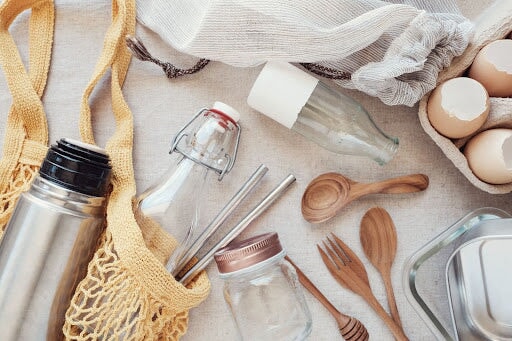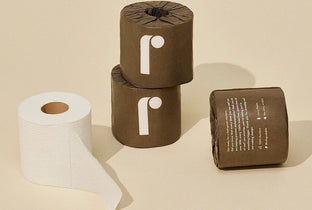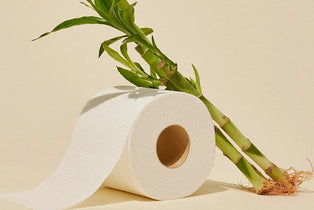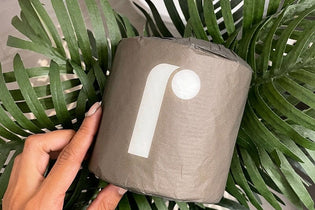
TLDR
In our quest for a greener planet, the movement towards a plastic-free lifestyle has gained significant momentum. As we navigate through the challenges of reducing our environmental footprint, it's essential to recognize the power of individual actions that not only help us better practice sustainable living as individuals but also foster a more sustainable future for everyone. This journey is not just about eliminating plastic from our lives; it's about creating a ripple effect that encourages communities, businesses, and governments to adopt more eco-friendly practices. By making conscious choices and advocating for change, we can collectively contribute to the health and well-being of our planet. Every small step we take is a leap towards a cleaner, more sustainable world for future generations. This comprehensive guide offers practical tips and insights into how to go plastic-free in various, everyday circumstances, featuring innovative solutions from Reel Paper that align with our eco-conscious goals.
Start with a Plastic Audit
Embarking on a plastic-free journey begins with a crucial first step: conducting a plastic audit in your own life. This process illuminates the extent of our daily plastic use, laying the groundwork for meaningful and sustainable change.
Assess Your Daily Plastic Use
By conducting a personal audit, we can pinpoint the areas of our daily lives where plastic use is prevalent. This exercise not only highlights our plastic footprint but also sets the stage for making mindful changes. It's a revealing process that often uncovers surprising amounts of unnecessary plastic, from kitchen storage to bathroom products, urging us to rethink our choices.
Identify Easy Swaps
Transitioning to a plastic-free lifestyle is made easier by identifying simple substitutions for commonly used plastic items. For instance, swapping plastic toothbrushes for bamboo alternatives or replacing disposable razors with metal ones can significantly reduce our plastic waste. Even switching from plastic-wrapped snacks to bulk bin options can make a big difference in reducing packaging waste.
Check out our blog on some easy plastic-free swaps you can make right now!

Switch to Reusable Water Bottles and Coffee Cups
Making the switch to reusable water bottles and coffee cups is a simple yet impactful action that significantly reduces our reliance on single-use plastics. This change also supports a healthier, more sustainable lifestyle.
Benefits of Reusable Drinkware
Not only does investing in a reusable water bottle or coffee cup minimize waste, but it also encourages healthier habits and saves money in the long run. Plus, with the wide variety of stylish and functional designs available, it's easy to find an option that suits your lifestyle and taste.
Impact on the Environment
The shift away from single-use plastic bottles and cups plays a crucial role in combating plastic pollution. By choosing reusable options, we can drastically cut down on plastic waste and protect our oceans and wildlife. This simple switch can save thousands of plastic bottles and cups from polluting our environment over a lifetime.
Opt for Plastic-Free Shopping Bags and Produce Bags
Opting for plastic-free shopping bags and produce bags is a straightforward and effective way to cut down on unnecessary plastic waste. This eco-friendly choice is essential for anyone looking to make their shopping habits more sustainable.
The Role of Tote Bags in Reducing Plastic
Reusable shopping bags, especially those made from organic cotton or other sustainable materials, are essential in the fight against plastic bags. They are not only durable but also versatile, serving multiple purposes beyond grocery shopping. Keeping a few in your car or bag ensures you're always prepared for impromptu purchases without the need for plastic.
Using Mesh or Cloth Bags for Produce
Similarly, opting for mesh or cloth produce bags instead of the plastic ones provided at stores can significantly reduce our plastic footprint. These reusable bags are lightweight, washable, and perfect for fruits and vegetables. They also help keep produce fresher longer by allowing it to breathe, reducing food waste alongside plastic use.

Replace Plastic Straws with Sustainable Alternatives
Replacing plastic straws with sustainable alternatives is a small but powerful step towards reducing plastic pollution. This easy swap can make a significant difference in our environmental impact, one sip at a time.
Options for Eco-Friendly Straws
The market is now flush with sustainable straw options, from stainless steel to bamboo and glass. These alternatives offer the same functionality as their plastic counterparts without the environmental toll. Many come with cleaning brushes and carry cases for convenience on the go.
The Environmental Cost of Plastic Straws
Plastic straws are a notorious contributor to ocean pollution. By choosing reusable or biodegradable straws, we can help protect marine life and reduce our plastic consumption. It's a small step that can have a big impact, especially when dining out or enjoying drinks with friends.
Choose Plastic-Free Food Storage Solutions
Choosing plastic-free food storage solutions is an essential move for anyone aiming to minimize their environmental footprint. Along with reducing plastic waste, this also promotes healthier living through safer, more sustainable storage options.
Reusable Containers and Wraps
Transitioning to glass jars, silicone bags, and beeswax wraps for food storage not only reduces plastic use but also keeps food fresher for longer. These alternatives are safer for our health and the environment. They can also add an aesthetic appeal to your kitchen, making sustainability both functional and stylish.
Reducing Plastic in Your Kitchen
By eliminating plastic wrap and disposable containers, we can make our kitchens more sustainable. Investing in quality reusable containers contributes to a zero-waste lifestyle and reduces the demand for single-use plastics. This shift not only benefits the environment but also encourages a more organized and mindful approach to food storage and preparation.
Embrace Plastic-Free Personal Care Products
Embracing plastic-free personal care products is a crucial step towards a more sustainable and environmentally friendly grooming routine and exposes us to healthier, more natural product options.
Shampoo Bars, Bamboo Toothbrushes, and More
The personal care industry is notorious for its plastic packaging. Switching to shampoo bars, bamboo toothbrushes, and solid conditioners can dramatically cut down on plastic waste. These products often come with the added benefit of being made from natural ingredients, offering a healthier alternative for both our bodies and the planet.
The Impact of Personal Care Products on Plastic Pollution
Personal care products often contain microplastics and are packaged in non-recyclable materials. By choosing plastic-free alternatives, we can reduce the environmental impact of our daily routines. This not only helps in cutting down on plastic waste but also in reducing the chemical pollutants that enter our waterways from traditional personal care products.

Use Plastic-Free Household Paper Products
Incorporating plastic-free household paper products into our daily routines is a straightforward yet impactful way to combat plastic pollution, and Reel Paper is leading the charge with our eco-friendly alternatives to toilet paper and other paper goods. By choosing Reel Paper's sustainable offerings, we not only reduce our plastic footprint but also support a cleaner, greener planet.
The Benefits of Bamboo and Recycled Paper
Bamboo and recycled paper products like Reel’s recycled paper towels offer a sustainable alternative to traditional paper goods, reducing the need for virgin pulp and the overall environmental impact. Bamboo, in particular, is a fast-growing, renewable resource that requires no fertilizer and regenerates from its roots.
Learn about how fast bamboo grows in our blog article.
Support Plastic-Free Cleaning Products
While cleaning is a necessity, it often comes with the caveat of potential exposure to hazardous chemicals, which when prolonged can be risky to one’s health. Choosing eco-friendly packaging materials is one way to lower this risk.
Eco-Friendly Cleaning Alternatives
Switching to concentrated cleaning solutions, refillable products, or homemade cleaners can significantly reduce plastic packaging waste. These alternatives are often more effective and less harmful to our health and the environment. Plus, they can introduce a sense of accomplishment and creativity into our cleaning routines.
The Role of Packaging in Plastic Reduction
Choosing products with minimal or plastic-free packaging is a crucial step in reducing our plastic footprint. Supporting brands that prioritize sustainability in their packaging choices can drive industry-wide change. This not only helps in reducing plastic waste but also in promoting a culture of responsibility and innovation among manufacturers.
Wear Clothes Made from Sustainable Materials
Wearing clothes made from sustainable materials is a powerful statement against fast fashion and its environmental impact, promoting a wardrobe that's both ethical and eco-friendly. This choice supports the health of our planet and encourages a more sustainable fashion industry, as well as helps save on closet space.
The Problem with Fast Fashion
Fast fashion contributes to a significant amount of plastic pollution through synthetic fibers like polyester. Opting for clothes made from natural or recycled materials can mitigate this impact. It's a shift that not only benefits the environment but also supports more ethical and sustainable production practices in the fashion industry.
You might also consider upcycling clothing, which refers to the process of transforming old or discarded textiles and garments into new, valuable pieces of clothing or accessories.
Choosing Environmentally Friendly Fabrics
Investing in garments made from organic cotton, linen, or bamboo not only reduces plastic use but also supports sustainable farming practices and reduces toxic waste. These materials are not only better for the environment but also offer greater comfort and durability, enhancing the overall quality of our wardrobes.

Reduce Plastic in Takeout and Groceries
Everyone loves a good meal. Unfortunately, when we purchase our favorite food, we run the risk of potentially generating food waste along with it, while also being all but guaranteed to end up with plastic waste right after. While the former can be dealt with via composting, the latter is best dealt with by reduction.
Bringing Your Containers
One of the simplest yet most effective ways to reduce plastic waste is to bring your own containers for takeout and bulk grocery shopping. This habit can significantly cut down on unnecessary plastic packaging. It also sends a strong message to businesses about consumer preferences for sustainability, encouraging them to adopt more eco-friendly practices.
Seeking Plastic-Free Options in Stores
Being mindful of packaging when shopping can lead to a substantial reduction in plastic consumption. Opting for products with minimal or no packaging, or those packaged in recyclable materials is a step towards a plastic-free lifestyle. This approach not only reduces waste but also often leads to healthier food choices, as many unpackaged foods are fresh and unprocessed.
Advocate for Wider Plastic-Free Initiatives
Advocating for wider plastic-free initiatives amplifies the impact of individual actions, driving systemic change toward a more sustainable and plastic-free world. This collective effort is crucial for fostering environmental stewardship on a larger scale.
Engaging with Community and Policy
Individual actions are powerful, but collective efforts can lead to systemic change. Engaging in community clean-ups, advocating for local plastic bans, and supporting policies that reduce plastic production are essential for widespread impact. These actions can inspire others to join the movement, creating a ripple effect of positive change.
Supporting Businesses with Plastic-Free Missions
By choosing to support businesses like Reel Paper, which are committed to reducing plastic pollution and promoting sustainability, we can drive demand for eco-friendly products and encourage more companies to adopt sustainable practices. This support not only aids in reducing plastic waste but also fosters a market where sustainability is valued and prioritized.
Reel Paper's Commitment to Plastic-Free Living
Reel Paper works extensively to embody innovation and sustainability in the paper product industry. Our dedication to plastic-free packaging and the production of only sustainable household paper products like bamboo toilet paper and recycled facial tissues exemplifies our continued commitment to a healthier planet. By incorporating Reel Paper products into our daily lives, we can make significant strides toward reducing our plastic footprint and fostering a more sustainable world.
Ultimately, thinking of how to go plastic-free presents various opportunities to make impactful choices. From conducting a plastic audit to embracing sustainable personal care products and supporting eco-conscious businesses, every step we take brings us closer to a cleaner, greener planet. Let's embrace these changes with optimism and determination, knowing that our collective efforts can lead to a more sustainable future for all.




0 comments